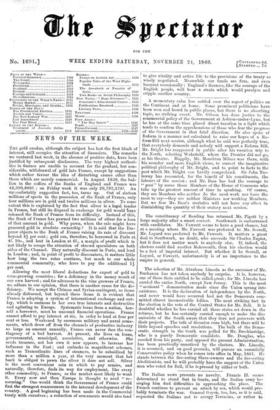NEWS OF THE WEEK.
THE gold exodus, although the subject has lost the first blush of interest, still occupies the attention of financiers. The remarks we ventured last week, in the absence of positive data, have been justified by subsequent disclosures. The very highest authori- ties in finance are unable to account for the gradual, but con- siderable, withdrawal of gold into France, except by suggestions which rather favour the idea of disturbing causes other than those which are merely commercial. In August 1859, the bul- lion in the coffers of the Banks of England and France was 42,390,888/. ; on Friday week it was only 29,797,3781. An uncomfortably suggestive fact, too, turns up. Out of sixteen millions of specie in the possession of the Bank of France, only four millions are in gold and twelve millions in silver. To some extent this is explained by the fact that silver is a legal tender in France, but still its disposal in exchange for gold would iiave released the Bank of France from its difficulty. Instead of this, the Bank of France has pawned two millions of silver for a loan of that amount in gold. Why pawn, when the sale might have procured gold in absolute ownership ? It is said that the Em- peror objects to the Bank of France raising its rate of discount beyond 41 per cent ; gold can, therefore, be borrowed in Paris at, 41. 10s., and lent in London at 61., a margin of profit which is ' not likely to escape the attention of shrewd speculators on both sides of the Channel. They naturally discount in Paris, and lend in London ; and, in point of profit to discounters, it matters little how long the two rates continue, but much to our whole commercial community, who have to pay the additional 11 per cent.
Allowing the most liberal deductions for export of gold to corn-growing countries ; for a deficiency in the money result of our own harvest ; and for advances to the vine growers of France, we adhere to our opinion, that there is another cause for the de- fioiency. We accept the Chinese and Syrian contingent, as items already disbursed, but beyond these items it is evident that France is adopting a system of international exchange and out- lay, which is ominous to her own true interests and destructive and agitating to Europe. Systematic loans from a nation, her- self a borrower, must be unsound financial operations. France cannot afford to pay interest at six, in order to lend at four per cent or less. Weakened by enormous military and naval arma- ments, which draw off from the channels of productive industry so large an amount annually, France can never face the con- tingency of a bad harvest. At present, she lives on loans, governmental, municipal, associative, and otherwise. She sends treasure, not her own it now appears, to increase her influence in the East ; and embarks in magnificent schemes, such as Transatlantic lines of steamers, to be subsidized by more than a million a year, at the very moment that her bank is obliged to pawn the silver it dare not sell. Silver is the most convenient coin in which to pay armies, and naturally, therefore, finds its way for employment, like every other commodity, to France, as the market most likely to want it. Every now and then Europe is thought to need " re- assuring." One would think the Government of France could find the strongest reassurances in the internal development of the country. A good beginning has been made in the Commercial treaty with ourselves ; a reduction of armaments would also tend to give vitality and active life to the provisions of the treaty so wisely negotiated. Meanwhile our funds are firm, and even buoyant occasionally ; England's finances, like the courage of the English people, will bear a strain which would paralyze and cripple another country.


























